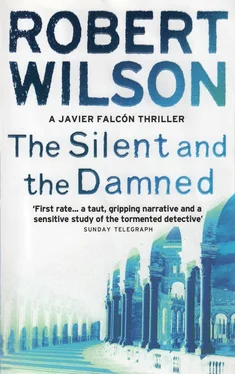The FBI could not reveal why they were talking to Ms Coren in connection with the Iranian carpet dealer's murder. They have only stated that no charges have been brought against the thirty-six-year-old photographer whose latest show 'Minute Lives' has just moved from the St Louis Art Museum. John and Martha Coren, who still live in Belleville, St Clair would make no comment on their daughter's FBI interview. Maddy Coren currently lives in Connecticut with her husband, the architect Martin Krugman.
The journalist's name was Dan Fineman and after reading it through a few times Falcón began to pick up the slightly mischievous tone of the piece. Its news- worthiness was hardly worth the column inches. He entered 'Minute Lives' into the search engine and a review came up with the headline 'Short on content. Small in stature.' The by-line was the same Dan Fineman. A man with a grudge.
Falcón typed Reza Sangari into the search engine. His murder had been well covered at a local and national level, and from these articles he was able to piece together the full story.
Reza Sangari was just thirty years old. He was born in Tehran. His mother was from a banking family and his father originally ran his own carpet factory until they left prior to the Iranian revolution in 1979. Reza was brought up in Switzerland but went to the USA to study Art History at Columbia University. After graduation he bought a warehouse on the Lower East Side from which he developed his carpet import and sales business. He converted the second floor into an apartment, which was where his dead body was found on 13th October 2000. He had been murdered three days earlier; he had taken two blows to the head with a blunt instrument, which had not killed him, but he had fallen sideways on to a brass bedstead which had. The weapon that caused the first wounds was never found. Because of the wide-ranging nature of the investigation and Sangari's international client list the FBI took over from the New York homicide cops and contacted all his clients and social acquaintances. They found he was seeing a number of women but not one in particular. There was no evidence of a break-in and nothing obvious had been stolen. There was nothing missing from the inventory. The FBI had been unable to develop any suspects in the case despite extensive interviews with the women he was seeing at the time of his death. Some of the names of these women had crept into the media because they were famous. They were: Helena Valankova (dress designer), Françoise Lascombs (model) and Madeleine Krugman. The last two were married women.
Friday, 26th July 2002
Falcón woke up and reached for a pen and notebook which he kept by the bed to record his dreams. This time he wrote:
She could have found out about the other women and done it.
He could have found out she was having an affair and done it.
Or it could be nothing at all.
He allowed his brain the run of this circuit for a few minutes and then wrote:
He could have killed Reza S. and not told her.
She could have killed Reza S. and not told him.
Or there could be some complicity.
Or it could be nothing at all.
He'd slept badly. The Ortega file was all over the bed, along with Alicia Aguado's dictaphone and tapes. He'd been up for hours, too spooked to go to sleep, and had recorded the Ortega file as he read it. Before he got under the shower he checked the strip of paper he'd stuck over the door. It was unbroken. At least he hadn't been sleepwalking. He let the water pummel his head and some of his frustration left him as a new possibility about Inés's photograph came to him.
The heat in the gallery outside his room smothered him. He looked down on the trickling fountain. He rippled past the pillars on his way to the kitchen. He ate a round of fresh pineapple and some toast drizzled with olive oil. He took his pills. His mind roved around the loneliness of the house. Inés had called it 'mad and enormous', which it was – a sprawling, illogical, labyrinthine expression of the state of Francisco Falcón's bizarre mind.
It came to him with a clarity that must have been obvious to everyone except himself, caught up in his months of self-absorption: Why live here any more? This is not your house and it will never be your home. Let Manuela have it. The only reason she's pursuing you through the courts is that she'd have to sell everything and take on a huge mortgage to be able to afford it.
He felt free. He started to punch out Manuela's number on his mobile and stopped himself just in time. He'd go through his lawyer, Isabel Cano. No sense in presenting things to Manuela on a plate. When people did that she just demanded more. The mobile rang.
'We have a meeting here at 9 a.m.,' said Calderón, tense and businesslike. 'I'd like you to come to that alone, if you don't mind, Javier.'
On the way to the Jefatura he dropped off the tapes at Alicia Aguado's consulting room in Calle Vidrio. Before going to his office he took the photograph of Inés to the lab along with some blank stock that he'd been using to print out his snaps. He asked Jorge to run a test to see if the paper was the same. Back in his office he read through the reports left on his desk. He collected all the necessary papers for his meeting and put them in his briefcase, separate from his internet findings about Madeleine Krugman nee Coren. He put the photograph of Pablo Ortega and Carvajal in there as well. He wanted to see the actor's reaction to it. He called Isabel Cano: still no answer from her office. Ramírez and Ferrera turned up as he was leaving. He told Ramírez that Calderón wanted to see him alone and that he should keep trawling through Vega's offices while the rest of the squad went door-to-door looking for Sergei and/or the mystery woman he'd been seen talking to.
The Edificio de los Juzgados was building up for an active morning. The stink of humanity sweating in hope and fear had reached an animal intensity and there was no air-conditioning unit in the world that could cope. Falcón went up to Calderón's first-floor office, which overlooked the car park and the El Prado de San Sebastián bus station. The judge was smoking. There were six butts already in the ashtray, each one smoked down to the filter. Falcón closed the door. Calderón's eyes were smudged dark underneath. He still had the intense look of someone returning to civilization after an experience in the wild. Falcón laid the autopsies and police reports in front of him and sat down.
Calderón read fast, his lawyer's brain taking in the large quantities of detailed information. He sat back with a freshly lit cigarette and sized up Falcón. He seemed on the brink of saying something personal but veered away from it as if this might be too confrontational too early.
'What do you make of all this then, Javier?' he asked. 'The foundations for the building of a murder case haven't exactly been laid by these autopsies. I'm surprised the Médico Forense wasn't prepared to commit himself more at this stage.'
'Officially,' said Falcón. 'Unofficially, like all of us at the Jefatura, he's extremely doubtful that it was suicide, which is why he doesn't want to release Sr Vega's body for burial just yet.'
'Let's look at the mental states of the deceased,' said Calderón. 'Sra Vega had a serious enough condition that she was taking lithium. Her husband was not only behaving strangely, as we've seen in Madeleine Krugman's photographs, but had also been to see two, possibly three doctors about his anxiety.'
Falcón knew that Calderón had wanted to say her name, had felt the need for its sweetness on his lips and tongue. It decided him that the internet downloads in his briefcase should stay there.
'The crime scene…' Falcón started.
Читать дальше
Конец ознакомительного отрывка
Купить книгу












